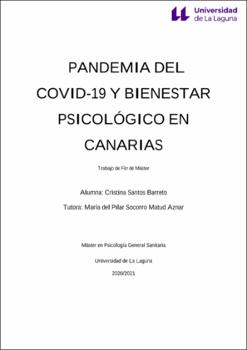Pandemia del COVID-19 y bienestar psicológico en Canarias
Autor
Santos Barreto, CristinaFecha
2021Resumen
El presente trabajo pretende conocer el bienestar psicológico en Canarias durante la
pandemia del COVID-19, analizando si existen diferencias entre mujeres y hombres y si
ello varía en función de dos fases de la pandemia: desescalada del confinamiento (mayo
y junio de 2020) y “nueva normalidad” (septiembre-octubre). El estudio es transversal y
la muestra está formada por 249 personas de la población con edades comprendidas entre
19 y 80 años que fueron evaluadas mediante tres cuestionarios. Los resultados mostraron
que las mujeres, respecto a los hombres, tenían más sentimientos positivos en la
desescalada del confinamiento, más sentimientos negativos en la “nueva normalidad” y
menor equilibrio afectivo en la fase de “nueva normalidad”. Además, los hombres tenían
mayor satisfacción con la vida que las mujeres, la cual no difería entre las fases de la
pandemia, mientras que no había diferencias significativas entre mujeres y hombres en
salud mental pero sí en función de la fase, siendo menor en la “nueva normalidad”. Los
resultados del presente trabajo permiten concluir que el género es relevante en el bienestar
psicológico de la población canaria, y también lo es la situación de pandemia, diferencias
que varían en función del tipo de bienestar que se considere. The present work aims to know the psychological well-being in the Canary Islands during
the COVID-19 pandemic, analyzing if there are differences between women and men and
if this varies depending on two phases of the pandemic: de-escalation from confinement
(May and June 2020) and "New normal" (September-October). The study is crosssectional and the sample is made up of 249 people from the population aged between 19
and 80 years who were evaluated using three questionnaires. The results showed that
women, compared to men, had more positive feelings in the de-escalation of confinement,
more negative feelings in the “new normal” and less affective balance in the “new
normal” phase. In addition, men had greater satisfaction with life than women, which did
not differ between the phases of the pandemic, while there were no significant differences
between women and men in mental health, but there were differences depending on the
phase, being less in the “New normal”. The results of this work allow us to conclude that
gender is relevant in the psychological well-being of the Canarian population, and so is
the pandemic situation, differences that vary depending on the type of well-being
considered.




